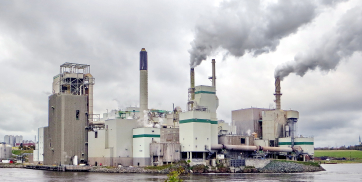The US Rejoins the Paris Accord
Former President Donald Trump withdrew the U.S. from the Paris climate agreement last year. The U.S. is the only signatory to have ever withdrawn. One of President Joe Biden’s first orders was to rejoin the agreement, signaling that the U.S. is taking climate change seriously again. The U.S. will meet with other world leaders in Glasgow for the United Nations Climate Change Conference (COP26) to update their climate pledges. Read about Biden’s climate pledges here.
Biden Ends Keystone, TC Energy to Cut 1000 Jobs
The Keystone XL oil pipeline project, which started in 2008, has continuously been fraught with legal battles and shifting decisions by changing US Presidents. President Joe Biden believes that the cancellation of the project will send a signal to infrastructure developers that will encourage the transition toward sustainable energy. However, the decision may have significant ramifications for the Canadian oil and gas industry and construction workers. Read about the President’s decision here.
NRCan’s Emissions Reduction Fund is Back
$675 million of funding is available to help Canadian O&G companies develop their methane emission reduction strategies in light of economic difficulties during the pandemic. Companies may submit multiple projects per application. Projects of $100k to $20 million may be awarded. There will be a 5-year payback period after the project is completed. The deadline is March 19, 2020. Details of the program here. Contact Highwood for help developing a project or writing an application.
View Highwood’s free quickguide infographic for the NRCan’s Emissions Reduction Fund program.
Global Methane Emissions Fell 10% due to Production Cuts
In 2020, the coronavirus caused a significant drop in global energy demand. This led to production cuts, which contributed to the reduction of methane emissions by 10% from 2019 estimates. As the world starts to recover from the pandemic, we must work to ensure that 2019 remains the peak year for global methane emissions. Regulatory action is needed to achieve that goal. In November 2021, the United Nations Climate Change Conference (COP26) in Glasgow will be an opportunity for governments and companies to showcase their commitment to reduce methane emissions to combat climate change. Read more here.
Hugo, GHGSat’s Third Satellite, Launches Successfully
On January 24, GHGSat launched their third satellite – named “Hugo” – aboard a SpaceX Falcon 9 rocket alongside a record-breaking 142 other satellites. GHGSat, a Québec-based methane monitoring company, is aiming to launch a total of 10 satellites by the end of 2022. Their satellites are designed to detect methane emissions with 100x stronger resolution and from sources 100x smaller than any other satellite. Learn about GHGSat’s plans here. GHGSat isn’t the only methane satellite partnering with SpaceX. In 2022, MethaneSAT will ride aboard a SpaceX rocket to join the methane–measurement party up in space.
Highwood’s Jessica Shumlich to Deliver JWN Course on Scope 1 Emissions
On April 27, Highwood’s CEO, Jessica Shumlich, will deliver a 5-hour course on measuring, quantifying, and reporting Scope 1 GHG emissions from upstream oil & gas facilities. To understand and quantify emissions, the site fence line must be understood, an equipment inventory must be developed, methodology must be confirmed, and assurance must take place so that emissions are adequately reported. Various methods exist for emissions quantification. An overview of when each method is appropriate will be given. The course will conclude with a real facility example, giving students the chance to put their new skills to use by identifying typical emissions sources, quantifying them, and reporting them. For more details about Highwood’s Scope 1 Emissions course, click here.
Other upcoming JWN courses:
February 17/18, 2021 – ESG Fundamentals by Rosa Rivero
March 11, 2021 – Navigating the energy regulator when conducting acquisitions and divestitures by Mark Taylor, Jeff Schatz, Alanda Allum and Rob Cruickshank
Elon Musk will award $100 MM to best carbon capture solution
Elon Musk, CEO of Tesla and SpaceX, has tweeted that he will be investing in methane emission reduction efforts with a pledge to donate $100 million to the best carbon capture technology. Using carbon capture, carbon dioxide waste can be captured from the air, or before it is emitted from power plants and factories. The captured carbon dioxide can then be transported and stored, thus preventing it from contributing towards global warming. The Intergovernmental Panel on Climate Change (IPCC) believes that carbon capture solutions are essential to combat climate change. View the article here.
New Research: Canadian Abandoned Well Methane Emissions Underestimated by up to 150%
According to a new study, the Canadian government underestimates methane emissions from abandoned oil and gas wells due inaccurate information about their location, number, and average emission rates. While oil and gas activity started in the 1850s, the first records are from 1955. That’s 95 years of missing data. Of an estimated 370,000 abandoned wells, over 60,000 are not accounted for in Canadian databases. The underestimate of methane emissions occurred because data were acquired solely from existing studies from BC and New Brunswick. Data from Alberta, the province with the largest number of wells, was not factored into creating the estimate. Read the article here.
The American Petroleum Institute will Work with Biden on Methane
The API announced their desire to work with Biden to develop methane regulations. They believe that direct regulation of methane is important for public confidence in the oil and gas industry’s performance. Read about API’s achievements in the space and how they will support the new administration here.
O&G Leases and Permits Suspended on US Land
Oil and gas will be harder to extract under the Biden administration. They announced a 60-day suspension of new leasing and drilling permits as part of a strategy to address climate change. There is an exception to the rule, which gives a few senior officers authority to approve actions. Critics fear job losses, an increase of foreign oil imports, and loss of tax revenues. During the last few months of the Trump administration, 1,400 permits were approved, which may hamper Biden’s climate change efforts. Read about the permit suspension here.
Local Student Coleman Vollrath Uses GIS to Identify Methane Hotspots
Local M.Sc. student Coleman Vollrath from the University of Calgary has shared some insights in a recent ESRI blog on how to use facility data to identify potential methane emission hotspots in Alberta. Coleman thinks an approach like this could be used as a risk-based approach to guiding screening surveys. Have a read of Coleman’s blog here.




